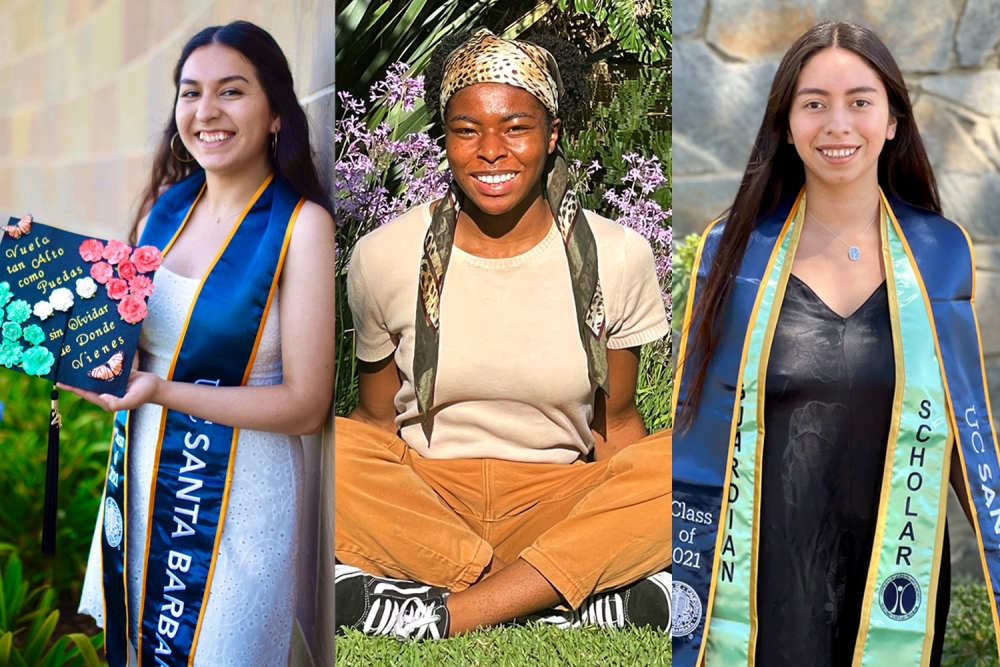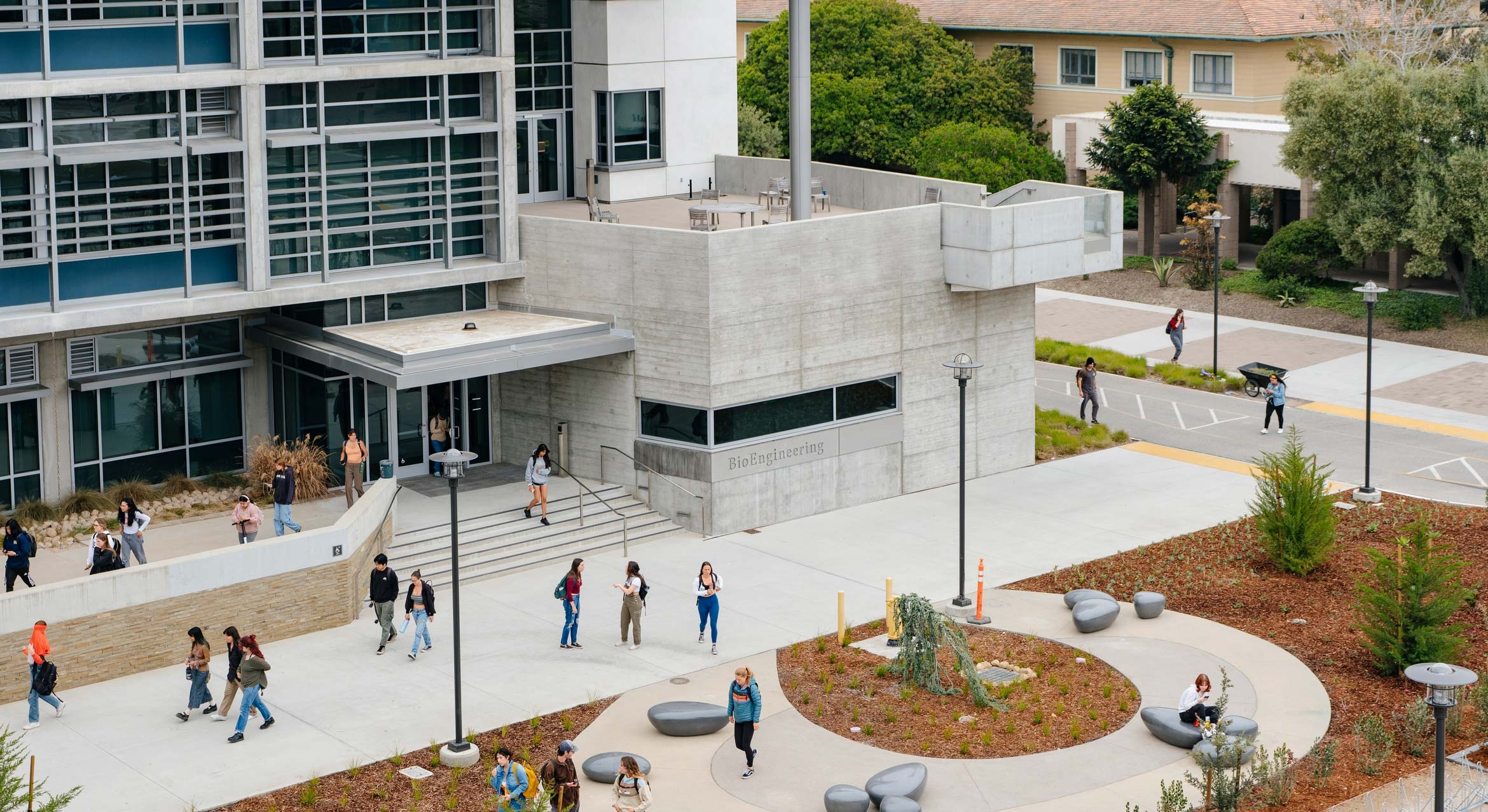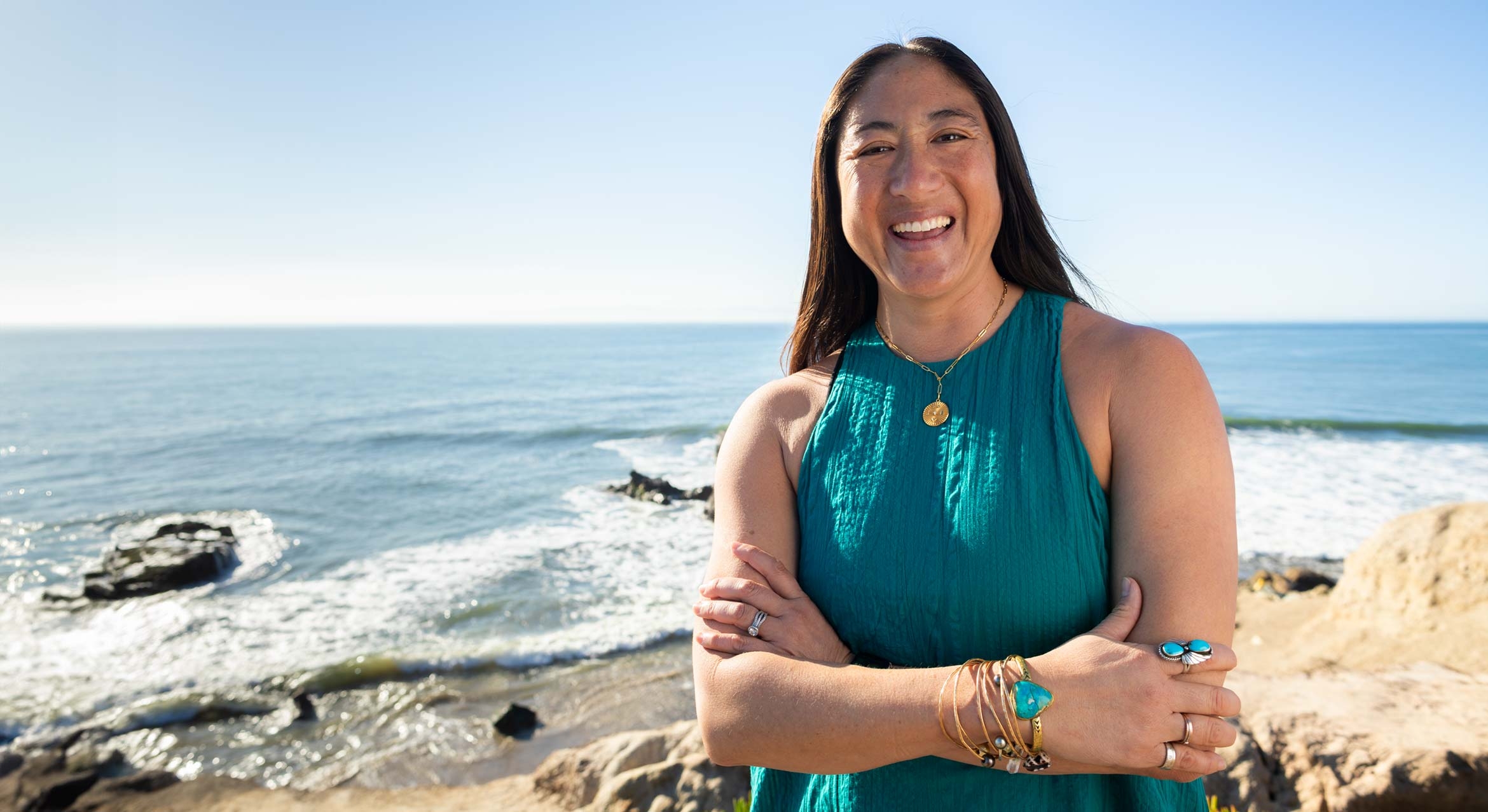
Promise and Persistence
Achieving a college education is challenging under the best of circumstances. For those who spent time in the foster care system or come from extreme low-income households — or both — the dream can seem close to impossible. Enter Promise Scholars and Guardian Scholars, two UC Santa Barbara programs designed to address the particular and complex needs of these students.
Promise Scholars
Originated by UC Santa Barbara, the Promise Scholars program represents the first financial aid package in the nation to provide four-year scholarships to high-achieving, low-income Californians. It’s the real deal — as are the Promise Scholars themselves, many of whom go on to win the university’s top awards and pursue graduate degrees at prestigious institutions across the country.
Betsabe Lopez Morales, graduating this week with a degree in sociology, is staying put. She is leaving Promise Scholars and becoming a PEAC Fellow in UCSB’s Gevirtz Graduate School of Education, aiming for a master’s in education and a career teaching middle school social studies in her hometown of Santa Barbara.
“This community has given so much to me and the best way I could think to give back is through education,” said Lopez Morales, an undocumented and first-generation college student. “I’m very thankful to all my teacher-mentors who believed in me and pushed me to succeed. I want to do the same for another generation of kids that have so much potential to do great things.”
Lopez Morales excelled in high school — AVID, AP and college classes, honor societies, 900 hours of volunteer community service — and was admitted to several universities. But she couldn’t afford to go. She decided instead to start at community college with the goal of transferring to UCSB later. Then she heard from Promise Scholars.
“I received an award letter saying I had been offered this amazing scholarship to my dream school that would allow me to graduate debt free,” she recalled. “At first I thought it was too good to be true and that they had mailed it to the wrong address. But after asking the financial aid office three times if I had really been offered this scholarship, I finally allowed myself to accept that it was true. They really had picked me.
“Because of this scholarship I was able to pursue amazing opportunities while at UCSB,” she added, “like a research assistant position and an internship with Planned Parenthood Central Coast Action Fund that I couldn’t have done without the help of Promise Scholars.”
Holly Roose, program director for Promise Scholars — many of whom are also Guardian Scholars — characterizes the students as the collective heart and soul of both initiatives.
“I have never seen such strength and perseverance as I am witness to all these students endure,” Roose said, “while somehow still managing to make excellent grades, graduate this very challenging research one university on time, and continue to move towards even greater achievements in life.
“Although it’s ultimately the student’s resilience and talent that gets them through each year towards graduation, they rely heavily on the support of programs like the Guardian Scholars and the Promise Scholars, as well as all of our generous donors, the Basic Needs Center, supportive staff on campus, and the faculty, just make it through the day to day when things get really hard,” she continued. “Something as small as a broken computer, or even bigger — a fear of where they will live or how they will find a meal — can often derail a brilliant student who already has so much weight to bear. Yet, thanks to these programs and resources, these students are very well supported by our campus community and we are thankful for that. It truly does take a village.”
Juanita “Uche” Iheanacho asserts that Promise Scholars has changed her life immeasurably, a “ticket out of my small town and my way into new freedoms and responsibilities” — and a debt-free passport to a degree. She will graduate this week with a degree in global studies and a minor in professional writing and multimedia communication.
A native of Vacaville and the daughter of two Nigerian immigrants, Iheanacho was “taught from a very young age to value my academics and to carefully craft my scholastic reputation so that one day I could receive the scholarship that would allow me to attend college.”
“I grew up in a low-income household, so I knew early on that a merit-based scholarship was my one ticket into university,” she said. “I worked tirelessly from elementary school to high school with my eyes on the prize. I was accepted with honors to most of the schools I applied to, but UCSB was the only one with the Promise Scholars program, which promised me consistent financial aid and a network of academic and personal support from my very first year.
“After making sure the amazing Promise Scholars Program wasn’t a fever dream or a scam,” Iheanacho continued, “I asked my mom to take me on a trip to tour the campus. We were greeted so warmly by the campus that day that I knew I’d found my home for the next four years.”
Now she’s got a new home in her sights: San Francisco. Next fall Iheanacho is moving on to San Francisco State University to pursue a master’s degree in ethnic studies. But first things first.
“In the more immediate future,” she said, “I will be focusing on congratulating myself on a job well done.”
Guardian Scholars
For students who have spent time in — and aged out of — the foster care system, college life poses similar challenges, but with a twist. Many are the first in their families to attend college and they have few, if any, individuals outside the university who can provide emotional or financial support or offer the wisdom of college experience.
Alondra Fernandez, a transfer student from Santa Monica City College who graduates this week with a bachelor’s degree in sociology and a minor in applied psychology, understands those difficulties firsthand. “As a kid, my brother and I were in the foster care system, and it can be an extremely traumatizing experience,” she said.
As a first-generation university student, Fernandez found herself navigating the challenges of college without a home-based support system. “When I first transferred to UCSB I found myself having a hard time adjusting to the new environment,” she said. “I was extremely overwhelmed and felt a bit lost.”
When Guardian Scholars advisors and coordinators invited her to an orientation, she was hesitant at first but decided to attend. “And I sure am glad I did. The Guardian Scholars program provided me with resources, advice and a community that I was missing,” she continued. “Guardian Scholars had a list of program liaisons for us who were exceptionally helpful in providing us with assistance.
“As someone who had very few resources outside of what UCSB provides to lean on, they were a saving grace,” she went on. And the proof is in Fernandez’s success. She has earned a 3.9 GPA.
“Alondra is a true inspiration and role model for all students,” said Lisa Przekop, director of admissions and of the Guardian Scholars Program. “The challenges and barriers she endured in foster care fueled her desire for a better life. She knew intuitively that higher education would provide opportunities to better the life of other students from similar backgrounds. She embraced every moment of her educational journey, fully utilized the support services of the Guardian Scholars Program and other UCSB services, and emerged as a top scholar. We are incredibly proud of her!”
Fernandez’s own experience has sparked her passion for helping children who find their lives upended. “My long-term goal is to become a social worker in the child welfare system,” she said. “My experience has only motivated me to want to ensure the safety and experience of children who are in foster care through no fault of their own, to make sure they are being treated fairly, have someone who is looking out for their best interests, and to make sure that they know they matter.
“I think it is important that we foster, provide resources and create programs to help these marginalized groups by preparing them for and ultimately helping them navigate higher education,” she continued. “Pursuing higher education and obtaining a four-year degree can seem almost like an impossible distant dream to most, but it is possible when you have advocates, the knowledge of resources available to you, and the right mindset. All of this to say, my passion is helping, mentoring and being a resource or a bridge for children who may not have anyone else to look to or rely on for help.”



